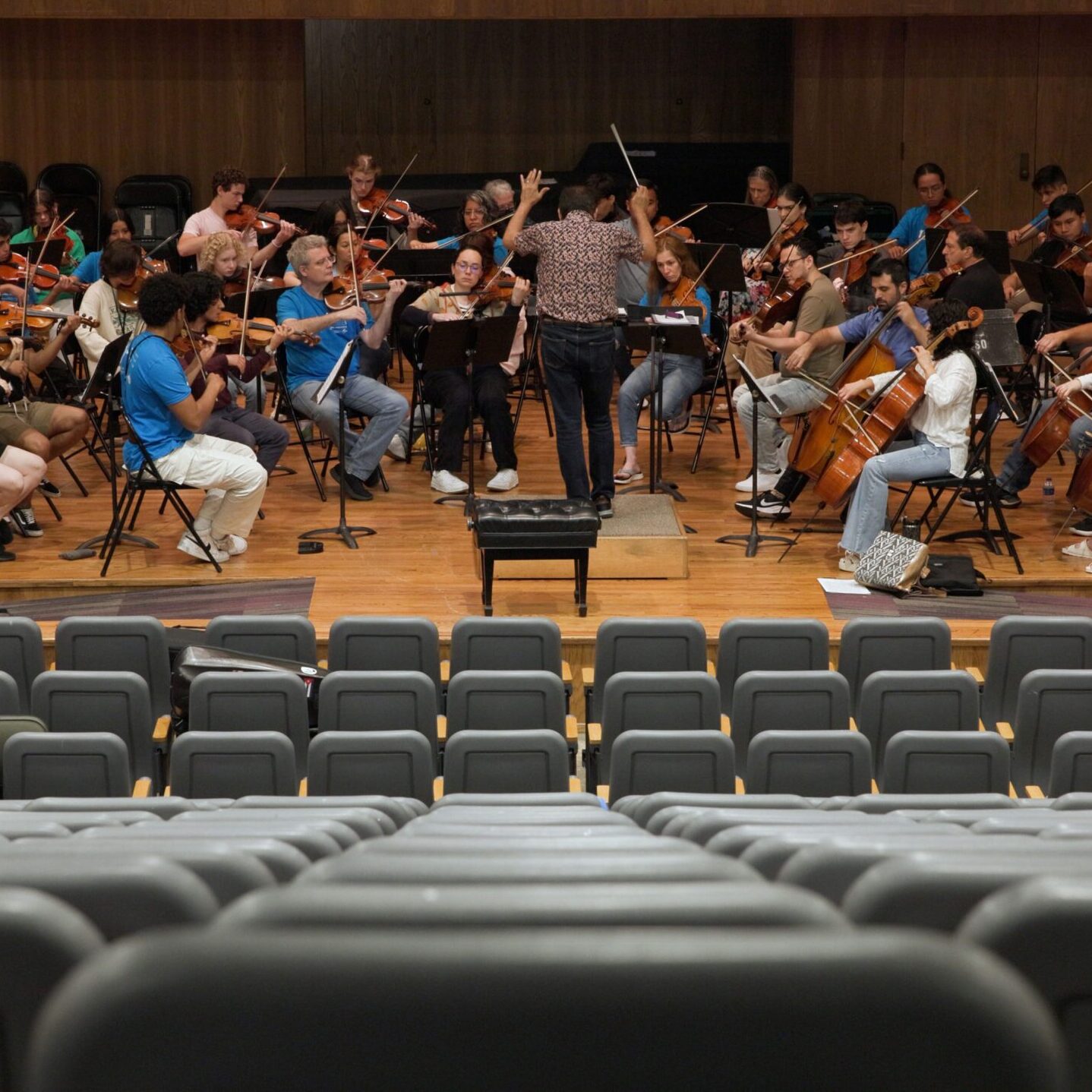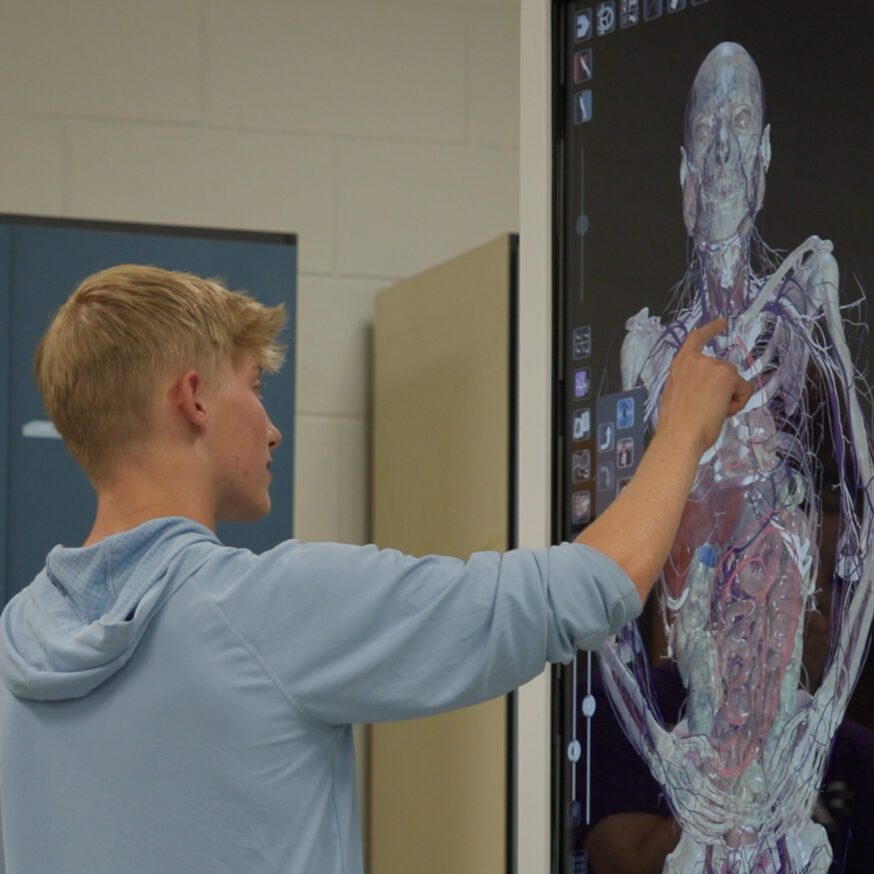Honors Program
The honors advantage
The Honors Program at Millsaps College offers the opportunity to pursue original work under the mentorship of a faculty adviser. It integrates past coursework with rigorous independent inquiry, which leads to more advanced scholarship.
The Millsaps Honors Program affords excellent preparation for students planning to continue graduate study or corporate research. Of equal or greater importance, however, is the personal satisfaction and academic maturity derived from the intellectually challenging journey. Students successfully completing the Honors Program will be recognized at graduation with an honors hood, and the designation of honors is included on the student’s official transcript.

The form of the honors thesis varies broadly. It may be a theoretical analysis, empirical study, musical composition, body of art work, business plan or another form that allows the student to assert and defend an original idea. The thesis project is similar to a master’s project but at a level appropriate for the Millsaps undergraduate student. The thesis is typically in the student’s major but may be in another field if the student has sufficient prior coursework or other academic experience. The thesis is written under the supervision of a faculty committee consisting of an advisor, a second reader and a member of the Honors Committee. The honors thesis project must be independent of research performed for another Millsaps requirement such as a senior research project.
The Honors Program director is Dr. Sarah Williams.
Requirements
In the fall of their junior year, students with a GPA of at least 3.300 are invited by the Honors Program director to participate in the Honors Program. Students must also have demonstrated writing proficiency on their writing portfolio to be eligible.
Eligible students must apply to the program by submitting a written thesis proposal that outlines a question, a method of inquiry and a committee of advisors who approve the research project. At least one of the committee members must teach in the area in which the student seeks honors. Please see Steps to Completion for suggestions on selecting a thesis committee and the guidelines of the research project proposal.
The Honors Program is an eight-credit experience that takes place over three semesters. In the spring of the junior year, students register for Honors I, an Honors research course with their thesis advisors. In the summer, students complete research and write a first draft of the thesis. In the fall of the senior year, all students register for Honors II, a second research course with their advisors. Students complete, revise and defend theses in the fall semester. In the spring of the senior year, students format their theses, deposit the final copy in the library and present their research publicly during the Honors Conference. See the Timeline & Deadlines for specific details.
Students who are studying abroad during the spring semester of the Junior Year may still do an honors project provided that the study-abroad experience benefits the honors research, and the thesis advisor supports the project. The requirement of HH-I in the spring will be waived for these students with the approval of the Honors Program director. [Revised, November 2, 2011]
Steps to Completion
1. Attend Orientation Session for the Honors Program (Fall, Junior Year)
Students interested in the Honors Program must attend an orientation session held in the fall semester of their Junior Year. Before this meeting, students should review the Honors Program guidelines online and in the program booklet. They should also read the description of honors in the appropriate major. The Honors Program director will provide students with additional information about the Honors Program, serve as a resource for contacting potential advisors and provide necessary administrative forms.
2. Select an Advisor and a Thesis Topic (Fall, Junior Year)
Perhaps the most important step in the thesis project is selecting an advisor and defining the thesis topic. Because mentorship is a crucial part of the honors experience, students should choose their advisor carefully, considering both the faculty member’s area of expertise and the potential for a close working relationship. Although it is not typical, a student may choose to have two thesis advisors when the project is clearly interdisciplinary and the expertise of two disciplines is vital to the project’s completion. The advisor must teach in the subject area in which the student is pursuing honors.
The thesis topic is usually within the student’s major but may be in another area if the student has sufficient background prior to the thesis work. The topic should be broad enough to require a spring semester of research during the Junior Year, a summer of writing and several weeks of revision in the fall of the senior year. It should not be so broad as to merit the time required of a Ph.D. dissertation. Students may find it helpful to look through previous theses, which are available in the archives room of the Millsaps-Wilson Library. The student and advisor work together to narrow the thesis topic down to a manageable set of issues.
3. The Honors Thesis Proposal (Fall, junior year)
The project proposal explains the topic and focus of the thesis project. It is completed by the student and the advisor and is due to the Honors Program director a week after Fall Break. All submissions must be electronic. While some portions of the proposal are completed by the student and some by the advisor, it is imperative that the two meet to discuss all areas of the proposal before the student prepares it. The Honors Committee will read and evaluate all proposals. Revisions may be requested for proposals judged insufficient or unclear.
+ Full Details
The proposal MUST be typed and MUST include the following:
To be completed by the student:
A. General information: Title of the project and advisor’s name, student’s name, email address, compus box number and telephone number
B. Project description: This should be as detailed as possible but at a minimum must answer the following questions:
- What is your topic question?
- What methods of research will you use to answer this question?
- What courses have you already taken that will support your research? What other academic experiences have you had to support your research?
C. Specific plan for completing the project, including answers to these questions:
- What specific tasks must you complete in order to write this thesis? What is your general timeline for the project?
- Which specific tasks will you have completed before spring break?
- Which specific tasks will you have completed before the end of spring semester?
- When are your meetings with your advisor for the spring term and, when possible, the summer?
- What specific tasks will be completed over the summer? Please list all other summer commitments you will have besides the thesis (e.g. work, summer school, travel).
D. The name and the department of the second reader:
The second reader should be a full-time member of the Millsaps faculty unless an outside professional is approved. The student should explain briefly how the second reader’s expertise will benefit the project. The second reader must be asked in advance and agree to serve in this capacity.
To be completed by the advisor:
A. Basis for evaluation:
The advisor will specify methods and criteria of evaluation, as in any directed study agreement. Please answer the following questions:
- What evidence of progress must the student show by the spring assessment meeting?
- What methods will you use to assess the student’s work?
- What practices will you use to support the student’s research and writing? (How frequently will you meet with the student? What kinds of written work will the student submit to you? How often?)
- How will the completion of each task weigh in the grade for Honors-I in the spring semester? Please specify.
- In the event that the honors thesis is not completed, how will the student’s work be credited?
B. Description of the advisor’s role:
How do you see your role in guiding the student’s work?
Both the student and the advisor must sign and date the proposal document.
4. Thesis Research and Progress Report (Spring, Junior Year)
During the spring of the junior year, students research their thesis projects under the direction of the thesis advisor while enrolled in Honors I.
By the Monday following spring break, each student must present written evidence of progress to all members of their thesis committee. Failure to complete this report on time could result in termination of the honors project. The progress report must contain the following information:
- Description of the development of the research question and method of inquiry
- Discussion of what work has been completed
- Discussion of the work yet to be completed and a time frame for completion
- A bibliography and discussion of how these sources support the research project.
Following spring break, the thesis committee meets with the student to assess the student’s progress and to address any problems. The committee judges whether adequate progress has been made for the project to be continued. The advisor is encouraged to participate fully and actively in the discussion. Within two weeks of the meeting, the Honors Committee member must submit a written assessment to the director of the Honors Program, the student and all thesis committee members.
5. Writing the Thesis (Summer)
It is strongly recommended that the student use the summer to write the thesis. The thesis should be written in the style appropriate to the discipline. Many students find it helpful to model the paper on a particular journal format. See the “Overview of Honors by Major” for more style and format guidelines. The student and advisor should discuss writing style before significant writing has begun.
Generally speaking, the thesis should include a table of contents, a thesis body, accompanying material (graphs, tables, etc.), and a bibliography. While the primary audience is professionals in the discipline, keep in mind that others not as familiar with the area will be readers as well (for example, Honors Committee reader, other students, etc.). To accommodate a general audience, even though it is not standard in academic journals, the paper should include a glossary to explain any terms or procedures not easily understood by the lay reader.
6. Thesis Completion and Defense (Fall, Senior Year)
A substantial draft of the thesis should be completed and submitted to the committee no later than the end of the first week of the fall semester. Students performing field or lab research in the summer may request an extension until Fall Break that must be approved by all members of the thesis committee. Students must then notify the Director of Honors. The defense draft of the thesis, signed by the advisor, must be given to all thesis committee members by the Friday prior to Fall Break. Students who have received formal extensions may turn in the defense draft two weeks before Thanksgiving. The members of the thesis committee inform the Honors Committee member if there are serious problems. If the thesis is fatally flawed, then the student will not be allowed to proceed with the defense.
The thesis defense is a 45-minute conversation between the student and the thesis committee about the thesis topic. Held in the weeks between Fall Break and Thanksgiving break of the senior year, the thesis defense provides an opportunity for students to present their work to a group of knowledgeable and interested researchers in the field. Typically students give a short (roughly 15-minute) presentation of the thesis followed by questions from the thesis committee.
Students are expected to incorporate any necessary changes into the final version of the thesis, which is due in February of the senior year.
7. Honors Conference Weekend (Spring, Senior Year)
The Honors Program hosts an Honors Conference in the spring semester of the Senior Year. Honors students are required to participate in the conference and present their research before an audience of peers, the campus community, and family and friends. The conference is the capstone experience of the Honors Program.
Final Words
Please be aware that each thesis committee evaluates projects at several stages and that these evaluations may result in the termination of an honors project:
- At the spring assessment meeting: If the spring semester research did not provide an adequate basis for moving forward with the project, the project may be terminated and the Honors-I course will be converted to an independent study.
- At the beginning of the fall semester: If the student did not complete sufficient research and writing during the summer, he or she will not be permitted to enroll in Honors-II during the fall.
- During the fall semester: If the work did not provide an adequate basis for defending the project in the fall semester, the project will be terminated and the Honors-II course will be converted to an independent study.
Support Mechanisms
1. The Thesis Committee
A student’s thesis committee consists of the thesis advisor, a second reader and an Honors Committee reader appointed by the Honors Program director. The Honors Program director will serve as this reader on some but not all thesis committees. All thesis committee members must be full-time Millsaps faculty, unless an outside professional is approved as a second reader.
2. The Thesis Project Advisor
The thesis project will be conducted under the supervision of an advisor/mentor selected by the student. The student and the thesis advisor should meet regularly (at least once a month) from the time they agree to undertake the project until its completion. Greater interaction between the student and the mentor will lead to a better product and more rewarding experience.
The advisor helps the student refine and focus the student’s ideas into a feasible project and develops a timetable for completing the thesis by the deadlines set. The advisor assesses the student’s work at several stages, reads and gives detailed feedback on drafts of the thesis. The thesis typically goes through several iterations. Students are expected to give the advisor ample time to read and comment on each revision.
Should insurmountable problems occur, it is the responsibility of the advisor to convey this to the student and end the thesis project.
3. The Second Reader
The second reader is selected by the student and the advisor as part of the initial honors project agreement. While second readers do not need to be experts in the thesis topic area, they should have enough expertise to offer productive feedback. The second reader’s responsibility is not as great as that of the thesis advisor and thus they should not read every draft of the project. They should have the opportunity to comment on major stages of the process, however, so that there are no surprises at the end.
4. The Honors Committee Reader
The Honors Program director assigns one member of the Honors Committee to serve as a third thesis reader after the initial Honors Agreement has been approved. While this reader will have substantive feedback, she/he also serves as a liaison to the Honors Committee and ensures the integrity of the process. The Honors Committee reader serves as a convener for the assessment meeting and honors defense and conveys the results of these meetings to the Honors Program director in writing.
5. The Honors Program Director
While actually serving on only a small number of honors thesis committees, the Honors Program director serves as a resource for all honors students and members of thesis committees.
If you have any questions, please contact Dr. Sarah Williams, Honors Program director.
Timeframe & Deadlines
Fall — First Semester Junior Year
Attend orientation session on Honors Program
Select a thesis advisor and a thesis topic
Select a second reader
Submit honors thesis proposal to the Honors Program director one week after Fall Break
Pre-register for Honors I
Spring — Second Semester Junior Year
Enroll in Honors I
Conduct research under the direction of the thesis advisor
Attend Junior Colloquium meetings with Honors director
Submit progress report to thesis committee and the Honors Program director by Monday following spring break
Meet with thesis committee for assessment meeting
Pre-register for Honors II
Summer — Summer Between Junior and Senior Years
Complete research and write thesis
Fall — First Semester Senior Year
Enroll in Honors II
Distribute a substantial draft of the thesis to all committee members by end of first week of classes, or submit request for an extension.
Revise thesis
Submit defense version of thesis to all committee members by Friday prior to Fall Break, or two weeks before Thanksgiving if an extension has been granted.
Defend thesis in the weeks between Fall Break and Thanksgiving
Spring — 2nd Semester Senior Year
Participate in and present research at the Honors Conference
Submit final version of thesis to the Honors Program director by February
Deposit final draft of thesis with acquisitions librarian

Latest News
Dentists’ Dreams Took Root at Millsaps
I loved that it was cool to be smart, to want to study, to want to succeed.

VIDEO: Premier Orchestral Institute
Everyone is having a blast. We are so thankful that we have a place we can call the home of POI in Millsaps — for many years now.

VIDEO: Camp MRI — Medical Readiness Initiative
My hope is that by exposing kids to so many different forms of healthcare, they wouldn’t just say ‘I want to help people,’ they would know how they could.

Millsaps Launches AI & Emerging Technology Center with $1 Million Grant
This investment affirms what Millsaps does best: prepare people to think, lead and innovate.
